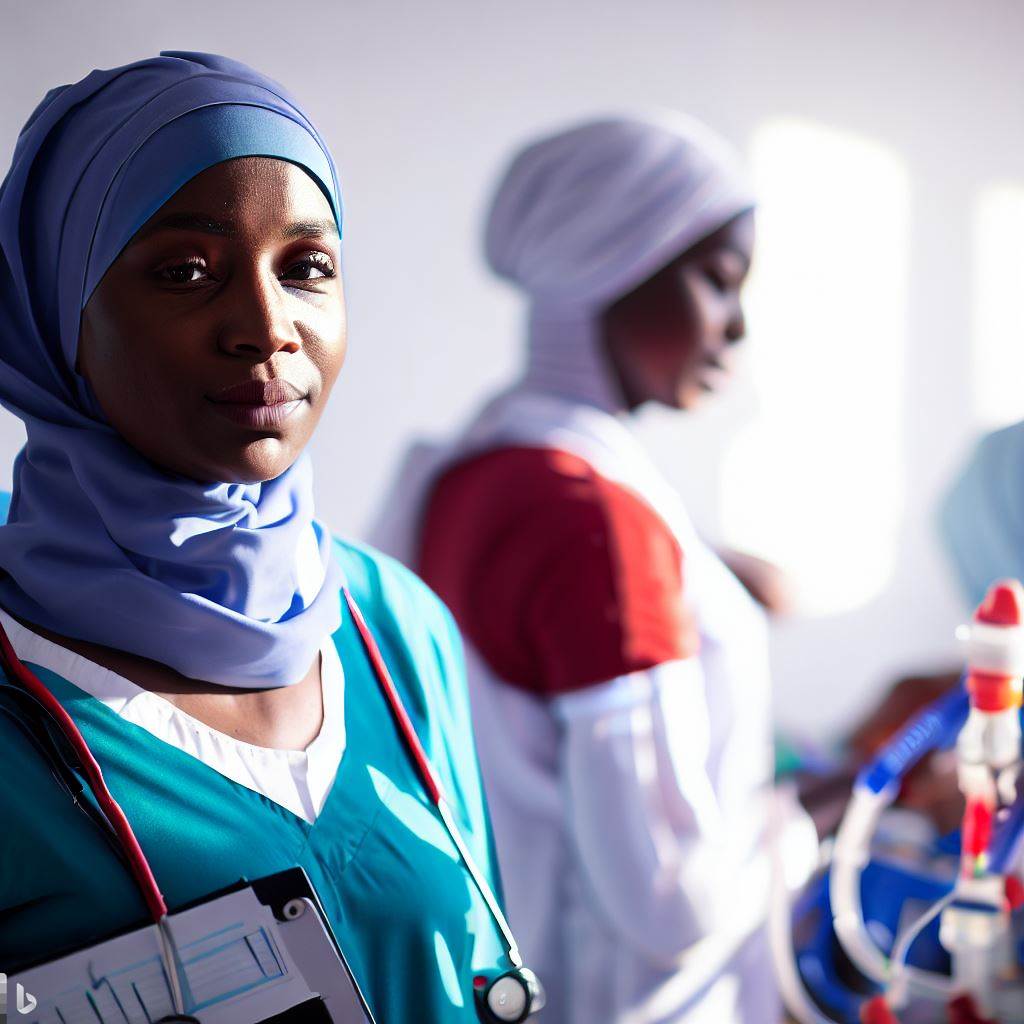Introduction
In Nigeria, becoming a physical therapist involves several steps that individuals must follow. The field of physical therapy is crucial in the country due to its importance and high demand.
Physical therapy plays a vital role in enhancing the quality of life for individuals in Nigeria.
It focuses on improving movement, function, and overall well-being, especially for those with musculoskeletal or neurological conditions.
The demand for physical therapy in Nigeria is significant, primarily due to the high prevalence of injuries and disabilities.
With an increasing population and changing lifestyles, the need for effective rehabilitation and recovery is on the rise. Physical therapists help people restore their mobility, manage pain, and prevent further injuries.
They contribute to the healthcare system by providing non-pharmacological interventions and promoting healthy living practices.
To become a physical therapist in Nigeria, aspiring individuals must complete a Bachelor’s degree in Physiotherapy from a recognized institution.
After graduation, they need to undergo a mandatory one-year internship program to gain practical experience.
Following the internship, graduates are required to pass the professional licensing examination conducted by the Medical Rehabilitation
Therapists Board of Nigeria. This certification enables them to practice legally as physical therapists in the country.
In the end, becoming a physical therapist in Nigeria requires dedication, education, and practical experience.
The profession is vital in meeting the growing demand for rehabilitation and improving the overall health of individuals in the country.
Research and Education
Research and education are crucial steps in becoming a physical therapist in Nigeria. They provide the foundation for understanding the field and preparing for the necessary qualifications.
Importance of Research
- Research allows aspiring physical therapists to gain a comprehensive understanding of the profession.
- It helps individuals identify the specific areas of physical therapy they are interested in.
- Through research, aspiring physical therapists can explore the latest advancements and trends in the field.
- Research also enables individuals to determine the demand and job opportunities for physical therapy in Nigeria.
Educational Requirements and Qualifications
In order to become a physical therapist in Nigeria, certain educational requirements and qualifications must be met.
- Completion of a Bachelor’s degree in a related field such as Anatomy, Physiology, or Kinesiology.
- Possession of a Doctor of Physical Therapy (DPT) degree is a primary requirement.
- Successful completion of the National Physical Therapy Examination conducted by the Medical Rehabilitation Therapists Board of Nigeria.
- Obtaining a license from the Medical Rehabilitation Therapists Board of Nigeria to practice as a physical therapist.
Institutions Offering Physical Therapy Programs
Several institutions in Nigeria offer physical therapy programs that provide the necessary education and training for aspiring physical therapists.
- University of Lagos: The Department of Physiotherapy offers a Bachelor’s degree and a Master’s degree in Physiotherapy.
- Ahmadu Bello University: The Faculty of Allied Health Sciences provides a Bachelor’s degree in Physiotherapy.
- University of Ibadan: The Department of Physiotherapy offers a Bachelor’s degree and a Master’s degree in Physiotherapy.
- University of Benin: The Department of Medical Rehabilitation offers a Bachelor’s degree in Physiotherapy.
- University of Nigeria: The Faculty of Medical Sciences provides a Bachelor’s degree in Physiotherapy.
In addition to these institutions, there are also private training centers and colleges that offer physical therapy programs.
Research and education are fundamental aspects of becoming a physical therapist in Nigeria. They equip individuals with the necessary knowledge and qualifications required for this rewarding profession.
By conducting thorough research, individuals can gain a deeper understanding of physical therapy and its various applications.
Additionally, they can identify the educational requirements and qualifications needed to pursue a career in this field.
The institutions offering physical therapy programs in Nigeria provide aspiring physical therapists with the necessary education, training, and practical experience to thrive in their profession.
Read: Challenges and Opportunities for Physical Therapists in Nigeria
Preparing for Admission
Preparing for admission into physical therapy programs requires careful planning and preparation. Several prerequisites must be met to be eligible for admission.
Aspiring physical therapists must have a high school diploma or its equivalent. Additionally, a strong background in science courses, such as biology, chemistry, and physics, is essential.
Prerequisites for Admission into Physical Therapy Programs
- Completion of a high school diploma or its equivalent.
- Strong background in science courses such as biology, chemistry, and physics.
- A minimum GPA requirement, usually above 3.0 on a 4.0 scale.
- Volunteer or work experience in a healthcare setting.
- Strong communication and interpersonal skills.
Admissions committees often look for a minimum GPA requirement, typically above 3.0 on a 4.0 scale.
In addition to academic qualifications, relevant work or volunteer experience in a healthcare setting is highly valued.
This experience allows applicants to gain insight into the field and demonstrates their commitment to pursuing a career in physical therapy.
Strong communication and interpersonal skills are also important for successful admission.
Necessary Documentation and Requirements
- Transcripts from high school and any post-secondary education.
- Letters of recommendation from teachers, professors, or employers.
- A well-written personal statement or essay showcasing your passion for physical therapy.
- Proof of completion of prerequisite coursework.
- Any additional documentation required by the specific physical therapy program.
When preparing for the admission process, it is crucial to gather all necessary documentation and meet specific requirements.
This includes providing transcripts from high school and any post-secondary education, as well as letters of recommendation from teachers, professors, or employers who can attest to the applicant’s qualifications.
A well-written personal statement or essay is often required to showcase the applicant’s passion for physical therapy and their motivation to pursue this career path.
Proof of completion of prerequisite coursework is also necessary.
Tips and Advice for the Admission Process
- Research and understand the admission requirements of different physical therapy programs.
- Prepare early by taking the necessary prerequisite courses and maintaining a high GPA.
- Gain relevant experience in healthcare settings through volunteering or working part-time.
- Seek guidance from current physical therapy students or professionals in the field.
- Practice for the entrance exams and interviews to increase your chances of success.
To increase chances of success, it is important to research and understand the admission requirements of different physical therapy programs.
Each program may have specific criteria and additional documentation needed. Preparing early by taking the necessary prerequisite courses and maintaining a high GPA is essential.
This demonstrates dedication and showcases academic abilities to admission committees.
Seeking guidance from current physical therapy students or professionals in the field can provide valuable insights and advice for the admission process.
They can offer tips on how to best prepare for entrance exams and interviews, which are common components of the application process.
Practicing for these exams and interviews can help applicants feel more confident and improve their performance.
In essence, preparing for admission into physical therapy programs requires meeting specific prerequisites, providing necessary documentation, and carefully preparing for the admission process.
It is essential to have a strong academic background, relevant healthcare experience, and excellent communication skills.
By following the suggested tips and advice, aspiring physical therapists in Nigeria can increase their chances of securing admission into their desired programs.
Read: Public Health Impact of Respiratory Therapists in Nigeria
Enrolling in a Physical Therapy Program
Different Types of Physical Therapy Programs in Nigeria
- Bachelor’s degree programs
- Master’s degree programs
Curriculum and Coursework in Physical Therapy Programs
In order to become a physical therapist in Nigeria, individuals must enroll in a physical therapy program. These programs are offered at both bachelor’s and master’s degree levels.
Bachelor’s degree programs in physical therapy typically span a period of four years.
Students in these programs are required to take a combination of general education courses and specialized physical therapy courses.
The curriculum may include subjects such as anatomy, kinesiology, physiology, biomechanics, and exercise science.
In addition to classroom lectures, students also engage in practical hands-on training through laboratory sessions and clinical rotations.
Master’s degree programs in physical therapy are designed for individuals who already hold a bachelor’s degree in a related field or have completed the prerequisites for the program.
These programs typically span a period of two to three years.
The curriculum at the master’s level builds upon the foundational knowledge gained in the bachelor’s program and covers advanced topics in physical therapy.
Students may choose to specialize in areas such as sports rehabilitation, neurology, pediatrics, or geriatrics.
Additional Certifications and Specializations in Physical Therapy
- Orthopedic Physical Therapy Certification
- Neurological Physical Therapy Certification
- Sports Physical Therapy Certification
- Pediatric Physical Therapy Certification
After completing a physical therapy program, individuals have the opportunity to pursue additional certifications or specializations to further enhance their skills and knowledge in specific areas of physical therapy.
These certifications allow physical therapists to provide specialized care to patients with specific conditions or to work with specific populations.
For example, obtaining an orthopedic physical therapy certification allows a physical therapist to specialize in treating musculoskeletal injuries and conditions.
Similarly, a neurological physical therapy certification enables a therapist to work with patients who have neurological disorders such as stroke or spinal cord injuries.
Sports physical therapy certification focuses on rehabilitation for athletes, while pediatric physical therapy certification focuses on working with children.
These additional certifications and specializations can be obtained through post-graduate programs or continuing education courses.
They provide physical therapists with the opportunity to expand their expertise and provide more specialized care to their patients.
In fact, enrolling in a physical therapy program in Nigeria is an essential step towards becoming a physical therapist.
These programs offer both bachelor’s and master’s degrees, with coursework that covers a wide range of subjects related to physical therapy.
Graduates of these programs can also pursue additional certifications and specializations to further enhance their skills and knowledge in specific areas of physical therapy.
Read: Overview: Physical Therapist Profession in Nigeria

Clinical Practice and Internship
One crucial step in becoming a physical therapist in Nigeria is gaining practical experience through internships and clinical practice.
This section will highlight the importance of hands-on training, discuss the duration and requirements of clinical placements, and provide information on finding internship opportunities.
Importance of Gaining Practical Experience
Internships and clinical practice play a vital role in the journey to becoming a skilled physical therapist. Theoretical knowledge is important, but nothing compares to the value of hands-on experience.
By participating in internships and clinical placements, aspiring physical therapists get the opportunity to apply the knowledge they have acquired in real-world settings.
This practical experience allows them to develop crucial skills and fine-tune their abilities.
Working with actual patients under the guidance of experienced professionals helps future physical therapists understand various conditions and learn to devise effective treatment plans.
It also enhances their communication and interpersonal skills, crucial for building rapport with patients.
Duration and Requirements of Clinical Placements
The duration of clinical placements can vary depending on the educational program, typically lasting for several months.
Each institution may have specific requirements regarding the number of hours or cases students must complete.
During clinical placements, students are supervised by licensed physical therapists, who guide them through different aspects of patient care.
They observe and assist with evaluations, treatment sessions, and the overall management of patients.
To successfully complete clinical placements, students must demonstrate proficiency in the core skills and competencies expected of a physical therapist.
They need to showcase their ability to assess patients, plan appropriate interventions, and document their findings accurately.
Finding Internship Opportunities
Securing internship opportunities is a crucial step for students pursuing a career in physical therapy.
Here are a few ways to find these valuable hands-on experiences:
- Contacting local hospitals, rehabilitation centers, and private clinics to inquire about internship programs.
- Seeking guidance from professors, mentors, or practicing physical therapists who can provide insights and recommendations.
- Exploring professional networks and organizations dedicated to physical therapy, as they often share internships and job opportunities.
- Utilizing online platforms and job boards specifically tailored to healthcare professions
Benefits of Hands-On Training
Engaging in hands-on training through internships and clinical practice provides aspiring physical therapists with several benefits:
- Opportunity to work with a diverse range of patients, broadening their understanding of different conditions and treatment approaches.
- Improvement of practical skills, such as manual therapy techniques, therapeutic exercises, and proper use of equipment.
- Enhancement of communication and patient management skills, as they interact with individuals from various backgrounds and age groups.
- Building a professional network by connecting with experienced physical therapists and potential future employers.
- Boosting confidence in their abilities, allowing them to enter the workforce with practical experience and readiness.
In short, clinical practice and internships are critical steps in the journey to becoming a physical therapist in Nigeria.
They provide the necessary practical experience, allowing aspiring professionals to develop skills, gain exposure to various conditions, and enhance their overall competence.
Read: Patient Perspectives: Interacting with Respiratory Therapists in Nigeria
Licensing and Certification
Obtaining a physical therapy license in Nigeria involves several steps overseen by the Medical Rehabilitation Therapists Board of Nigeria (MRTB) and the Nigerian Society of Physiotherapy (NSP).
To start the process, one must complete a recognized Bachelor’s degree in Physiotherapy. After graduation, the individual can apply for registration with the MRTB by submitting the necessary documents and fees.
The MRTB reviews the applicant’s qualifications, ensuring they meet the board’s requirements, which include completing the required educational program and passing relevant examinations.
Successful candidates will be invited for an interview and assessment.
The interview evaluates the candidate’s knowledge, skills, and competencies in physical therapy. Upon passing this stage, the candidate receives a license to practice as a physical therapist in Nigeria.
Holding a license allows them to offer legal physical therapy services in different healthcare settings.
To maintain the certification, physical therapists must fulfill continuing education requirements, such as attending workshops, conferences, and seminars to enhance their skills and knowledge.
Publish Your Professional Profile, Business or Brand
Showcase your expertise, gain trust, and boost visibility instantly on Professions.ng.
Publish NowThe NSP provides professional development opportunities, like research projects and clinical practice exchange programs, to further support licensed physical therapists.
Contributing to professional guidelines and standards is also encouraged.
Continuous professional development ensures the delivery of high-quality care and keeps therapists updated with the latest advancements in the field.
In summary, obtaining a physical therapy license in Nigeria involves completing a Bachelor’s degree, applying for registration with the MRTB, and undergoing an interview and assessment process.
Continuing education and professional development are crucial for maintaining certification and enhancing skills in the field.
Read: The Path to Becoming a Surgeon in Nigeria
Job Opportunities
The various career paths available to physical therapists in Nigeria
Physical therapists in Nigeria have a wide range of options when it comes to their career paths. They can choose to work in hospitals, clinics, rehabilitation centers, or even start their own private practice.
Demand for physical therapists in different healthcare settings, such as hospitals, clinics, or rehabilitation centers
The demand for physical therapists in Nigeria is significant across various healthcare settings.
Hospitals often have dedicated physical therapy departments where therapists work closely with other healthcare professionals to assist patients in their recovery.
Clinics and rehabilitation centers also require the expertise of physical therapists to provide essential services to patients.
The potential for private practice or entrepreneurship in the field
Physical therapists in Nigeria also have the opportunity to establish their own private practice.
This allows them to have greater control over their work environment and the ability to tailor their services according to their specific interests and expertise.
Entrepreneurship in the field can lead to greater financial independence and the opportunity to make a more significant impact in the community.
Overall, the job opportunities for physical therapists in Nigeria are diverse and promising.
Whether working in established healthcare settings or venturing into private practice, physical therapists have the chance to make a meaningful difference in the lives of their patients.
Conclusion
Becoming a physical therapist in Nigeria requires several key steps. Firstly, it is important to complete a bachelor’s degree in a related field such as biology or exercise science.
Next, aspiring physical therapists must enroll in a Doctor of Physical Therapy (DPT) program, which typically takes three years to complete.
After obtaining a DPT degree, graduates must undergo a one-year internship or clinical rotation to gain hands-on experience in the field.
This internship provides valuable practical skills and allows individuals to apply their knowledge in real-life situations.
Dedication is crucial in this profession, as physical therapists must continuously update their knowledge and skills to keep up with advancements in the field.
Continuous learning is essential to provide the best possible care for patients and to stay current with new treatment techniques and technologies.
Passion for helping others is a fundamental aspect of being a physical therapist. This profession requires empathy, patience, and a genuine desire to improve the health and well-being of patients.
It is a rewarding career that allows individuals to make a positive impact on people’s lives on a daily basis.
For those aspiring to pursue a career in physical therapy, it is important to stay motivated and focused. Challenges may arise, but with dedication and hard work, individuals can achieve their goals.
Remember, success in this profession is not solely defined by financial gain, but by the satisfaction of seeing patients progress and regain their mobility.
Becoming a physical therapist in Nigeria is a fulfilling and rewarding journey that requires commitment, continuous learning, and a passion for helping others.
Stay determined, stay compassionate, and embark on this noble profession to make a difference in the lives of others.




